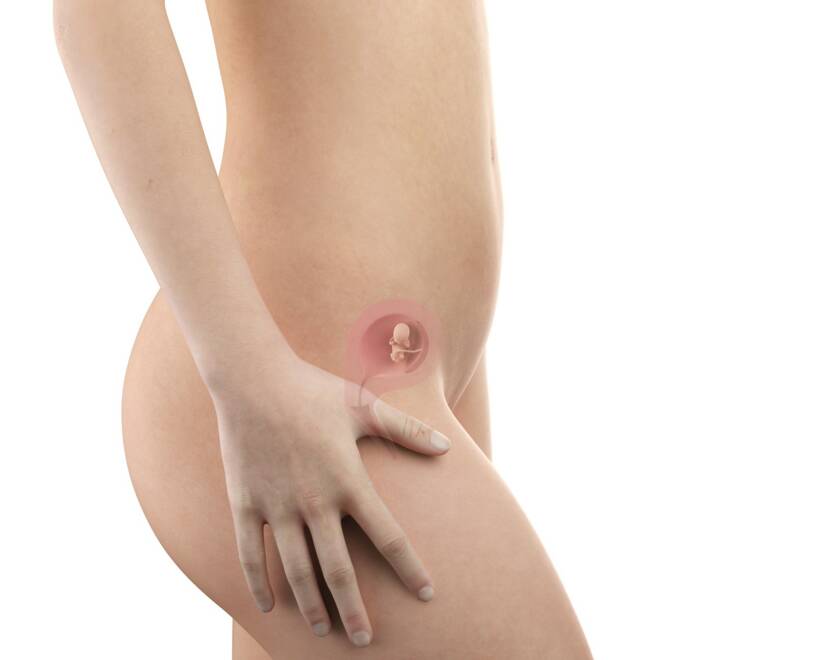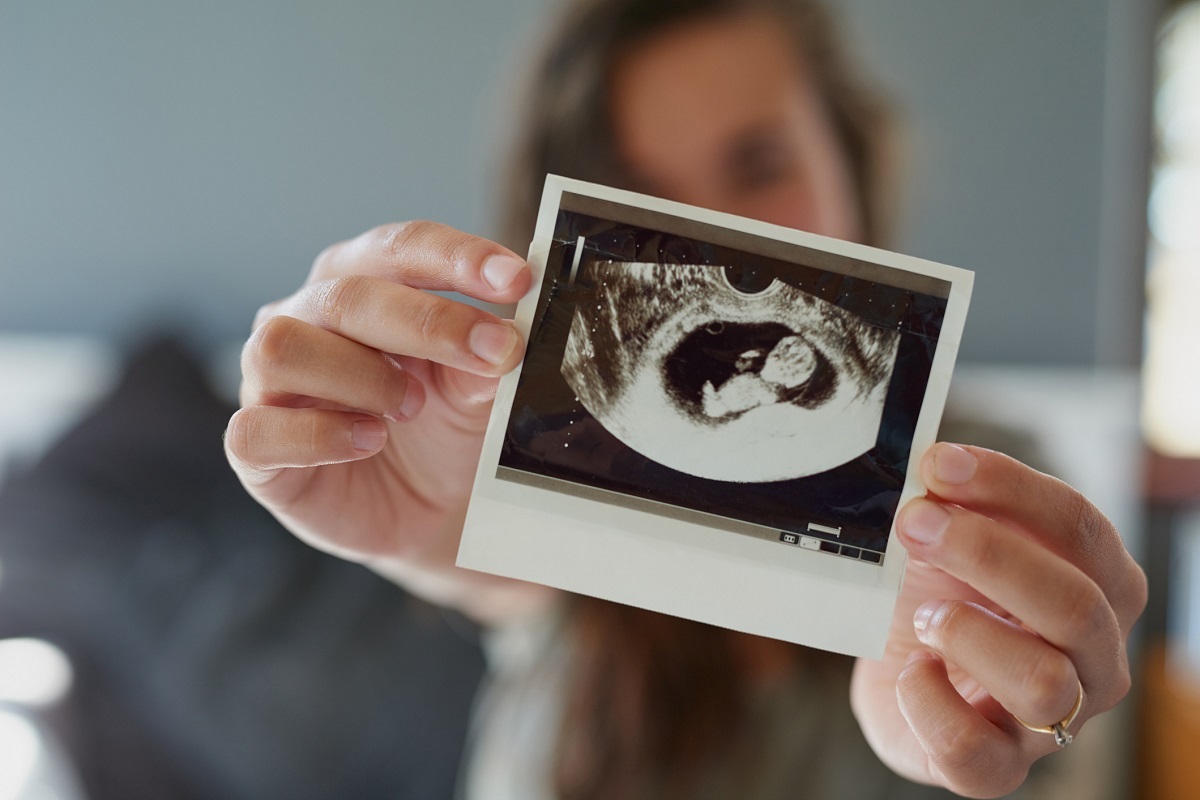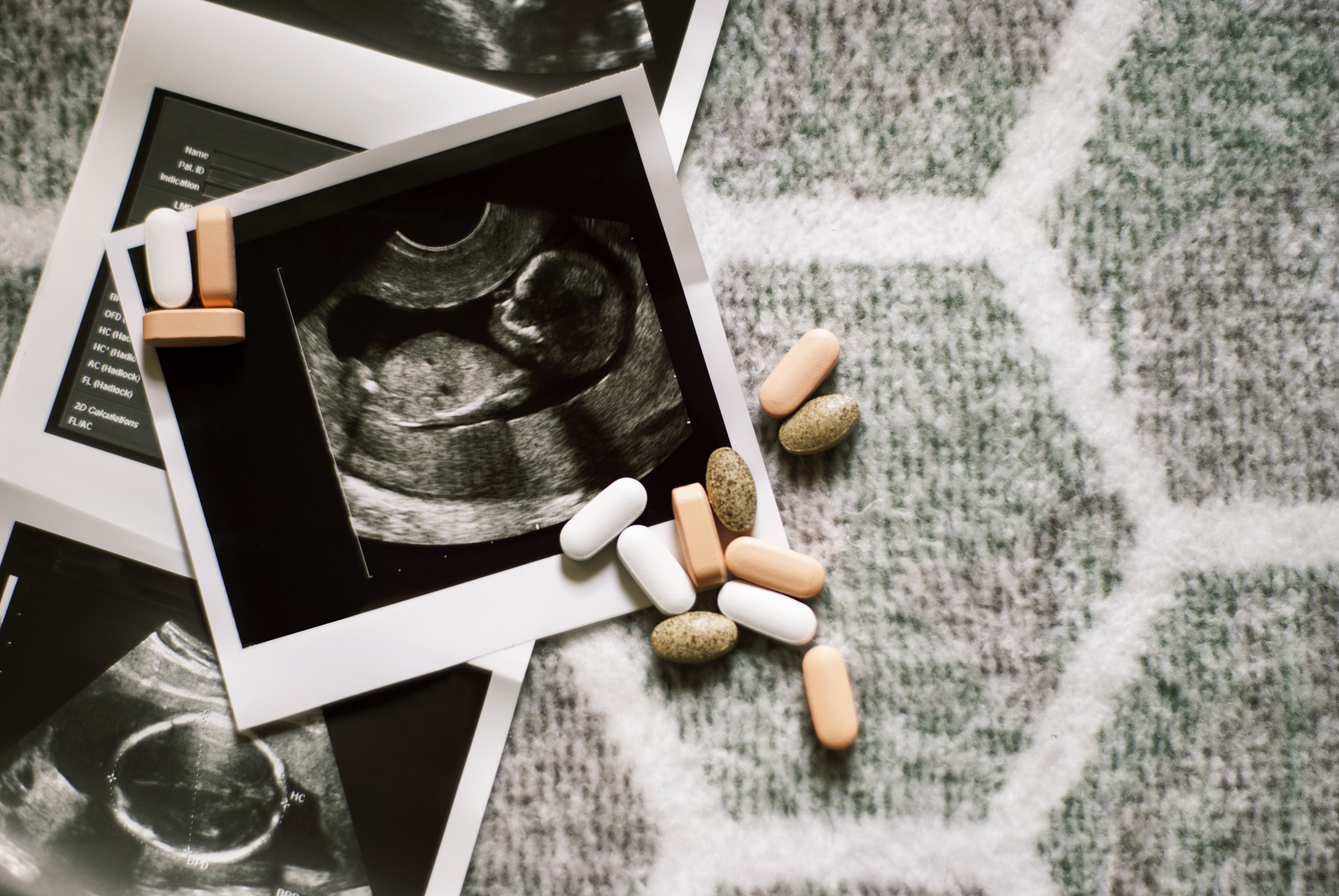- Pregnancy and childcare: Jane Symons
- nhs.uk - Week-by-week quide to pregnancy
- whattoexpect.com - 10 Weeks Pregnant
- verywellfamily.com - Week 10 of Your Pregnancy
- flo.health - 10 Weeks Pregnant
Week 10 of pregnancy: is your baby already becoming a fetus?

Your baby is still tiny, but it has already formed almost all its organs. From this week on, we no longer look at it as an embryo. But it is already becoming a fetus that will grow and develop until birth.
Article content
You are 10 weeks pregnant, 3 months pregnant and in the first trimester.
This week of pregnancy marks the end of your baby's embryogenesis. The fetal period begins, when the embryo is already becoming a fetus.
It has almost all the vital organs already formed and beginning to function.
From now on, the fetus will enter a period of growth and development.
How is your baby developing in your tummy?
Fetal growth during this period is very rapid.
Your baby measures approximately 37-44 mm and weighs 2-4 g at week 10 of pregnancy.
You can read more about fetal size in the article.

His head is getting bigger compared to his body. His face is already forming nicely and taking on the appearance of a baby.
The brain continues to develop rapidly and gives signals to the organs to function.
His eyes are half-closed. His eyelids continue to grow and close to protect the eye from amniotic fluid. Your baby can now respond to light.
The ears are forming and moving into place on the head.
The little nose has two visible nostrils.
Deep in the gums, the germs of baby teeth are beginning to form.
The heart pumps blood in the little body and beats at a rate of approximately 160-180 beats per minute.
The short tail at the end of the spine slowly disappears completely.
The skeleton is made up of cartilage and the first skeletal cells begin to form in the arm.
Bones, cartilage, knees and ankles are forming.
The joints in the hands and feet are already functional. The baby can bend the hands and feet at the joints.
Fingers and toes are lengthening.
The fetal skin is still very thin to translucent and the spine is still visible through it.
The liver has begun production of red blood cells.
The stomach is already producing digestive juices.
Your baby is beginning to swallow amniotic fluid. Using the kidneys, which are already producing urine, it will urinate it.
The fetus is in constant motion, moving, kicking, moving its arms and legs.
You can't feel its movements yet, because it is still too small. But in a few weeks it will grow in size and strength and you will feel its movements.
How does a woman feel at 10 weeks pregnant?
Your tummy is starting to bulge outwards. You will probably already have trouble buttoning up the trousers you were wearing before without any problems.
Your breasts are growing and are sensitive to touch. The nipple area is beginning to darken. Veins may be visible on your breasts, which are circulating blood.
During pregnancy, the volume of blood in the bloodstream increases by a little less than 50%. The volume of the veins increases and there may be more visible veins not only on your breasts but also on your body. You may notice this first on your arms. The veins are thicker and more bulging.
Your weight is slowly increasing. Unless you're suffering from severe nausea, you've probably already put on a few pounds.
What should be the weight gain during pregnancy, you can read in the article.
Fatigue. You probably feel increasingly tired during the day and getting up in the morning is becoming more challenging. In a month's time, you should feel better with an influx of energy. The fatigue should subside as the placenta takes over its full role and nourishes your baby.
Morning sickness or nausea during the day is likely to persist for you. But levels of the pregnancy hormone HCG, which peaked in the previous week, are slowly beginning to decline. The morning sickness should subside as you move into the second trimester.
Frequent visits to the toilet are due to the pressure of the growing uterus on the bladder.
Heartburn is a symptom that often persists throughout pregnancy. Your digestion is slowed down by pregnancy hormones.
Slowed digestion and its effects such as bloating, gas and frequent burping are uncomfortable for you but beneficial for your baby. It is the slowed digestion that allows nutrients to be better absorbed into the blood and move across the placenta to the fetus.
Mood swings in pregnancy are common. You may wonder about yourself. One minute you'll find something funny and the next you'll start crying and you won't even know why.
Increased libido is caused by increased blood flow in the pelvic area and pregnancy hormones. Some women experience sex more intensely during pregnancy.
You can read in the article.
Headaches are not only caused by the influence of hormones, but their trigger can be hunger, thirst and fatigue.
For a headache, try a cold compress on your neck or face, lie down in a dark room and ventilate. Being in the fresh air can also help with a headache.
Pain-relieving drugs are not recommended in the first trimester of pregnancy.
It is best to discuss the use of any medication with your gynaecologist or pharmacist to find out if it can be used during pregnancy. Not every medication is suitable during pregnancy and in every trimester. Some medications can compromise fetal development and the course of pregnancy.
Paracetamol can be given in the 1st and 2nd trimesters, but is prohibited in the 3rd trimester.
Drugs containing ibuprofen can be taken only in necessary cases after consulting a doctor in the 1st and 2nd trimesters.

Weakness and feelings of dizziness may be caused by the increased amount of blood circulating in your body. Be careful when changing positions, especially when getting up from lying down. Sit down first and only get up after a while to avoid feeling faint.
The feeling of dizziness can also be caused by a lack of blood sugar. Therefore, always carry something small and sweet that you can have immediately if you feel dizzy.
Pregnancy food cravings and food aversion. These feelings are probably familiar to you, a huge appetite suddenly replaced by a feeling of aversion to vomiting.

Constipation often accompanies the expectant mother during the whole pregnancy. To avoid it, add fiber to your diet with sufficient fluid intake. Avoid white flour products, rice. Add whole grain products, plenty of fruits, vegetables and a very good choice against constipation is dried fruit.
Increased discharge of milky color. Your pelvic area is more engorged due to the hormone estrogen and this results in increased production of discharge.
You can read more about discharge in the article.
Feeling cramps in your abdomen similar to menstrual pain. Your uterus is growing and this can cause uncomfortable pain. If the cramps become stronger, painful or come at regular intervals, see your doctor or nearest hospital immediately.
Sleep problems. Your sleep becomes less good. You feel that you are only awake during sleep, you often wake up feeling like urinating, you wake up groggy in the morning and you are more tired during the day.
Strange dreams. Your dreams may seem strange and vivid.

Your sense of smell is heightened and sensitive to different smells and odors that can sometimes make your day unpleasant.
A small percentage of women report a metallic taste in their mouths during pregnancy.
Visiting the gynaecologist at week 10 of pregnancy
If you haven't had any blood draws yet, you will probably have routine blood tests to determine your blood type and Rh factor, and your blood count will be examined this week. Serological tests to detect infectious hepatitis B, syphilis, HIV, rubella, and toxoplasmosis will also be performed.
Another test is a first trimester blood draw to detect birth defects, i.e. screening for Down syndrome and other chromosomal abnormalities.
In the consultation room, your weight is measured, blood pressure, urine is tested for protein. At the doctor's discretion, the fetus, its length, activity, heart function, fetal and placental positioning are checked.
What we recommend and what to look out for
- Your tummy is getting bigger. You'd better reach for looser clothes that won't press around your tummy.
- The bra should be comfortable, not squeeze you and not tighten your breasts too much. The most suitable bras are made of cotton, sports bras or bras made specifically for pregnancy.
- Your diet should be hearty, easily digestible and with sufficient vitamins.
- Eat plenty of fresh vegetables and fruit.
- Take prenatal vitamins to cover all the requirements needed for fetal development.
- Drink plenty of fluids, unsweetened drinks and teas are best. Be careful when choosing teas as not all teas are suitable for pregnant women.
- Avoid alcohol, nicotine, chemicals and all negative influences that could compromise fetal development.
- Do not consume undercooked meat, eggs and unpasteurised dairy products.
- If you feel tired, rest, do not overexert yourself and do not strain.
- Take some time during the day to walk in the fresh air, which will energise you, make you think better and help you sleep better at night.
- To keep fit, pregnancy exercises that you can do in the comfort of your home are good.
- Take care of your skin, which requires extra care during pregnancy. Keep it sufficiently hydrated and massage it, which is beneficial against stretch marks.
Read also interesting articles:
- In pregnancy, beware of anemia. What causes, symptoms?
- In pregnancy, it is necessary to minimize them
- Head spinning in pregnancy: at the beginning and as a symptom, what else does it mean?
- Hemorrhoids in pregnancy and after childbirth: Why do they arise, how to treat them?
- You are pregnant and you are troubled by pain in the lower abdomen?
- What is the placenta, when is it formed and what is its function during pregnancy?
Read more about the other weeks of pregnancy in the summary article.
Gallery




Interesting resources
Related










